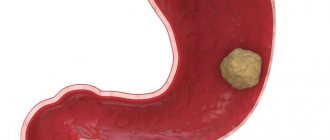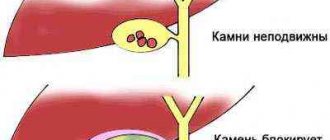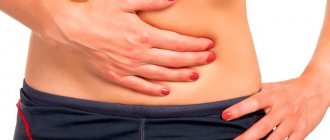Every woman who finds out that she will soon become a mother looks forward to the rounding of her tummy, and then the first timid kicks of the baby.
Very often, women notice that a certain pulsation occurs in the lower abdomen, which, at the same time, can occur at different stages of pregnancy. Another difficulty lies in the fact that women cannot explain their feelings. The first pregnant woman says that there is “something tapping” inside her, the second - that there is “something moving” there, the third pregnant woman will say that she feels “stirring”, and the fourth - “contraction”. All this seems to be true, since we all have completely different thresholds of sensitivity and, therefore, the most important thing to remember is that pulsation during pregnancy is not an anomaly, but it is still necessary to tell your gynecologist about it. If the pulsation is accompanied by pain, you should consult a doctor.
What organs are located on the left side of the abdomen?
The very state of the expectant mother’s body is what pain in the left side is often associated with. Due to the increased load on the organ system, “failures” are possible.
The causes of pain are often pathological in nature.
Most of the internal organs are located in the abdomen, including those on the left that may be of concern: the left-sided kidney, pancreas, spleen. In addition, it “gives” to the lateral region on the left due to inflammatory processes in the gastrointestinal tract, diaphragm, and also due to overstretching of the ligaments that hold the uterus.
All organs that signal a disorder of their functions through pain are necessary for the normal functioning of any person, and for the expectant mother their well-functioning work is doubly important.
The role of the kidneys in the life of the human body is invaluable. These paired organs, located in the lumbar region, act as filters and are directly involved in the functioning of the excretory system.
The kidneys are adjacent to the wall of the peritoneum, which is why pain is felt in the lower abdomen. An increase in the volume of circulating fluid in the mother's body forces them to work with redoubled force, which makes these organs vulnerable to infections.
Nonspecific inflammatory processes such as nephritis and pyelonephritis may worsen or occur for the first time, and renal failure may develop. If during pregnancy the left side of the lower abdomen hurts, and discomfort is felt in the lower back, it means that there may be a left-sided renal exacerbation.
Disturbances in the functioning of the spleen can also appear during pregnancy. This organ is located in the upper left part of the peritoneum, its purpose is to cleanse the blood of dead red blood cells and export them to the bone marrow, where new blood cells are formed.
Among the most common diseases of the spleen:
- her heart attack;
- twisting of the “leg”;
- abscess.
Chronic diseases of this organ lead to a general weakening of the immune system, which is very dangerous for both the mother and the fetus.
Quite often the stomach also makes itself felt with unpleasant symptoms. Heartburn and gastritis are frequent accompaniments of pregnancy, and a stomach ulcer can also form. Disturbances in the functioning of this digestive organ are a possible cause of pain in the left side during pregnancy. And this is largely explained by the connection between the stomach and the pancreas.
Pancreatitis is an inflammatory process in the pancreas, in which enzymes, instead of being transported to the duodenum, remain in the gland, undergoing self-digestion there. In this case, severe cutting pain on the left below the ribs may be disturbing. Uncontrollable vomiting with bile impurities often occurs.
The left side hurts during pregnancy and due to intestinal dysfunction. At first, it is provoked by the hormone progesterone, which relaxes the intestinal muscles and leads to frustration and a slowdown in the movement of food through it. Then the growing uterus begins to compress the intestines, which is often manifested by symptoms such as constipation, diarrhea, flatulence, etc.
The diaphragm also suffers during pregnancy, especially during toxicosis, when it experiences excessive tension due to vomiting and nausea. Then the growing fetus begins to put pressure on the diaphragm. With excessive stress, a diaphragmatic hernia may develop.
In addition, the uterus itself, when stretched, causes pain in both the left and right sides, as well as on both sides at the same time.
Sharp pain is a sign of disease
Often, the expectant mother develops diseases of the internal organs, sometimes in an acute form. This is explained by a decrease in a woman’s immunity, hormonal imbalance, and some displacement of internal organs by the growing uterus.
Most often, severe pain occurs with the following diseases:
- Acute appendicitis . The development of this pathology begins with acute pain, which intensifies over time. The pain is often accompanied by nausea, vomiting, and increased body temperature. Acute appendicitis most often occurs in the second trimester and requires emergency surgery.
- Cholecystitis (inflammation of the gallbladder). In the acute form of the disease, the patient experiences sharp pain, which is accompanied by nausea, vomiting, and belching.
- Cystitis (inflammation of the bladder). Acute sharp pain is accompanied by frequent urination, during which urine is released in small portions. Blood may appear in the urine.
Only a medical specialist can determine the exact cause of severe pain during pregnancy. Therefore, if the pain becomes constant, intensifies, or occurs frequently, you should immediately consult a doctor. Only a timely diagnosis and proper therapy will allow a woman to recover and safely bear a child.
Signs and diagnosis of pain in the left side during pregnancy
Left abdominal pain during pregnancy varies in location and nature. Based on these signs, a preliminary diagnosis can be made. So, you need to listen and determine exactly how your left side hurts.
The pain may be:
- peritoneal – acute-piercing, aggravated by movement and turns of the body;
- visceral – having a “aching” character, sometimes cramping, most often occurring when the functions of the gastrointestinal tract are disrupted;
- unstable localization, “wandering”;
- radiating, manifesting itself in the area of healthy organs.
Short-term pain that is not periodic should not worry the expectant mother. Most likely they are associated with the growth and vital activity of the fetus.
But if they are constant, it hurts to sleep on your left side, the discomfort intensifies when walking, after eating, you need to undergo an examination to establish the cause of this condition.
Alarming symptoms
There are pathological conditions that are characterized by pain in the lower abdomen. They can be divided into two large groups:
- obstetrics;
- not obstetric.
The former may indicate a threat of miscarriage, the presence of an ectopic pregnancy, or the beginning of placental abruption. The latter are associated with the digestive tract, stretching of the abdominal muscles when internal organs are displaced, and the presence of an acute phase of a chronic disease. The etiology of the malaise is determined by the general clinical picture.
When there is a threat of losing a child, the intensity of the aching pain is higher than during menstruation: it spreads across the groin and radiates to the lower back, accompanied by heavy bleeding that does not go away for several hours. If you ignore this problem, the nature of the pain changes and cramping spasms appear. The gynecologist, examining the patient, finds out that the cervix is becoming significantly shorter.
During an ectopic pregnancy, the fertilized egg is not able to leave the fallopian tube; it “populates” in it and gradually grows. The tube cannot stretch like the uterus, so the fetus eventually thins the walls of the tube and provokes their rupture - this can happen as early as the eighth week of pregnancy. A woman in such a situation experiences sharp cramping pain. They occur predominantly in one side (right or left), radiate to the anus, leg, rib and are so strong that they can lead to loss of consciousness.
When the tube ruptures, intraperitoneal bleeding occurs. The patient's blood pressure drops sharply, severe tachycardia appears, pale skin, diffuse abdominal pain that worsens with movement.
Abdominal trauma, gestosis, arterial hypertension, and abnormal course of labor can provoke placental abruption. In this condition, the integrity of the uteroplacental vessels is disrupted, bleeding occurs, fluid accumulates between the placenta and the uterus, and a hematoma is formed, which increases the intensity of detachment. The woman’s condition depends on the area of the lesion. With internal bleeding, the pain is severe and diffuse. The uterus is tense and has a dense consistency. Proportional to the area of detachment, cardiac dysfunction occurs.
Pain as a sign of appendicitis
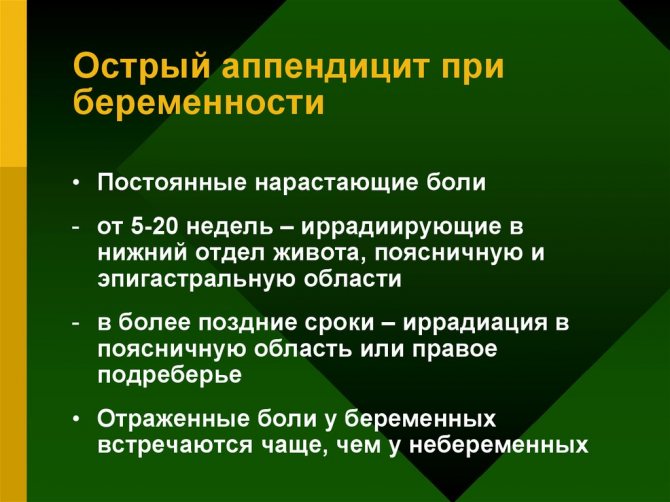
It is difficult to diagnose inflammation of the appendix when carrying a child. Its main symptom is pain in the abdominal area. They may relate to other diseases or be a symptom of egg fertilization. If discomfort occurs on the right side, it should be monitored. When it persists for a long time and does not go away after rest, gets worse with any movement, and is accompanied by nausea and vomiting, you need to consult a doctor.
Flatulence during pregnancy
If pain develops on the right side, but goes away on its own within a few hours, most likely, this syndrome was provoked by gases formed in the intestines. This is a common occurrence for those who are pregnant. Fertilization of the egg triggers a change in hormonal levels. As a result, the digestion process slows down and food stays inside the tract a little longer. Over time, the growing uterus begins to compress its individual parts, this aggravates the situation. A walk in the fresh air, properly selected physical exercises, and swimming can help correct the situation.
Symptoms of hiatal hernia
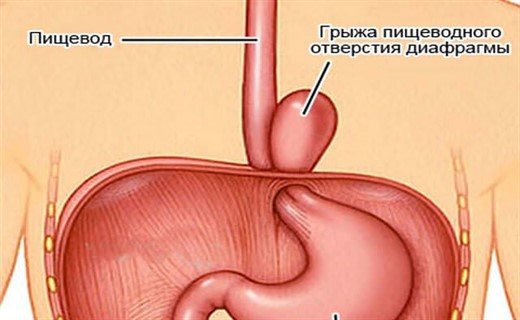
Overweight women often experience a small portion of the stomach protruding into the chest through a natural opening in the diaphragm. With this condition, pain in the lower abdomen may appear. But along with them, acid reflux, heartburn, and obstruction are also necessarily present: food gets stuck inside the hernia, and it can only be removed from there by stimulating vomiting.
Cystitis
The disease develops when pathogens enter the bladder. This becomes possible due to severe hypothermia, non-compliance with personal hygiene rules, and the spread of infection through an ascending route. Pathology has a detrimental effect on the body. Its formation leads to sharp pain that intensifies during urination. This is the main diagnostic criterion. This symptom has nothing to do with pregnancy.
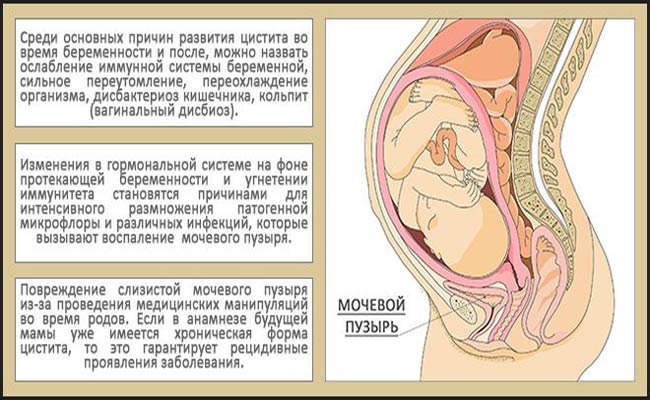
Gallstones
Stones form when digestive secretions produced by the liver become trapped in the gallbladder and harden. As a result, right-sided pain appears, which radiates to the lower spine and down the abdomen. It can be provoked by excessive physical activity, physical activity, and consumption of fatty foods. Hepatic colic causes intense pain, much stronger than that experienced early in pregnancy.
Discomfort in the lower abdomen cannot be a 100% sign of conception. Its presence may indicate inflammatory processes occurring in the pelvic organs, or the development of pathologies of embryonic formation. To eliminate existing risks, it is important to visit a gynecologist when the syndrome appears and undergo the necessary examination.
Causes and nature of painful discomfort in the left side
Can my left side hurt due to pregnancy itself? Of course, there are enough reasons for discomfort without pathologies of internal organs.
In the first trimester
Quite often in the first trimester of pregnancy, the left side feels tight, which is explained by endocrine changes. The pregnancy hormone, progesterone, has a relaxing effect on the muscles of the pelvic and digestive organs. The uterus begins to stretch, and a nagging pain occurs that is short-term in nature.
However, if it is accompanied by bloody discharge, then this is a dangerous symptom that may indicate a lack of progesterone and the threat of miscarriage!
In the early stages, you must warn your doctor about any abdominal pain!
In the second trimester
The second trimester is a time of intensive development of the baby, and this affects the condition of the expectant mother. The growth of the uterus causes increased pressure on the bladder and intestines, which fully explains the pain in the lower left abdomen. Due to the increase in circulating blood, the spleen also experiences stress. It increases in size and may from time to time remind itself of pain.
In the third trimester
The third trimester is the stage of baby’s weight gain and accelerated growth. The mother's tummy rapidly increases in size, it often pulls and tingles, which can be explained by compression of the internal organs and intestines.
Pain under the ribs occurs when the baby rises high, and when the baby’s head goes down, pain in the back of the lumbar region begins to disturb, and when the pelvic bones separate, girdle pain occurs.
It is worth listening more carefully to the sensations - often during pregnancy, at the end of the term, the left side pulls during false or true contractions.
Reason #2. vena cava
Doctors are often inclined to believe that pulsation in the lower abdomen occurs due to the fact that the vena cava can be completely or partially compressed - this is called in the professional language “inferior vena cava compression syndrome.” Most often, this problem occurs no earlier than the 25th week of pregnancy. The reason for this syndrome lies in the fact that the uterus grows and puts pressure on the lower abdomen, while also pinching the vena cava, disrupting the normal transportation of venous blood. But for this reason, unlike when the baby just hiccups, a pregnant woman may experience severe discomfort: dizziness, nausea and even loss of consciousness.
That is why doctors do not advise a pregnant woman to lie on her back, since it is in this position that strong pressure comes on the vena cava.
How to behave in case of pain - necessary measures and prevention
To prevent left-sided pain from bothering the expectant mother, prevention should be done at the stage of pregnancy planning.
Namely:
- Forget about bad habits.
- Stick to proper nutrition.
- Avoid gaining excess weight.
- Pay sufficient attention to physical activity.
- Get examined and treated for existing infectious and chronic diseases.
In the case of left-sided pain in the side already during pregnancy, it is possible, on the contrary, that there is increased physical activity. Wearing a bandage helps relieve tension from the abdominal and back muscles.
If the pain is of a physiological nature, there is no danger. However, it is contraindicated to violate regular visits to the antenatal clinic!
Expert advice
What do doctors advise pregnant patients for pain in the left side?
If your stomach hurts suddenly, you can take a no-shpa tablet; perhaps it’s just a spasm, which can be quickly and without consequences relieved with an antispasmodic. Then you need to take a comfortable body position (it’s better to lie down).
